- Home
- J. M. Barrie
The Annotated Peter Pan (The Centennial Edition) (The Annotated Books) Page 10
The Annotated Peter Pan (The Centennial Edition) (The Annotated Books) Read online
Page 10
There was the same excitement over John, and Michael had even a narrower squeak; but both were kept, and soon you might have seen the three of them going in a row to Miss Fulsom’s Kindergarten school, accompanied by their nurse.
Mrs. Darling loved to have everything just so, and Mr. Darling had a passion for being exactly like his neighbours; so, of course, they had a nurse. As they were poor, owing to the amount of milk the children drank, this nurse was a prim Newfoundland dog, called Nana,12 who had belonged to no one in particular until the Darlings engaged her. She had always thought children important, however, and the Darlings had become acquainted with her in Kensington Gardens,13 where she spent most of her spare time peeping into perambulators, and was much hated by careless nursemaids, whom she followed to their homes and complained of to their mistresses. She proved to be quite a treasure of a nurse. How thorough she was at bath-time; and up at any moment of the night if one of her charges made the slightest cry. Of course her kennel was in the nursery. She had a genius for knowing when a cough is a thing to have no patience with and when it needs stocking round your throat. She believed to her last day in old-fashioned remedies like rhubarb leaf,14 and made sounds of contempt over all this new-fangled talk about germs, and so on. It was a lesson in propriety to see her escorting the children to school, walking sedately by their side when they were well behaved, and butting them back into line if they strayed. On John’s footer15 days she never once forgot his sweater, and she usually carried an umbrella in her mouth in case of rain. There is a room in the basement of Miss Fulsom’s school where the nurses wait. They sat on forms, while Nana lay on the floor, but that was the only difference. They affected to ignore her as of an inferior social status to themselves, and she despised their light talk. She resented visits to the nursery from Mrs. Darling’s friends, but if they did come she first whipped off Michael’s pinafore and put him into the one with blue braiding, and smoothed out Wendy and made a dash at John’s hair.
No nursery could possibly have been conducted more correctly, and Mr. Darling knew it, yet he sometimes wondered uneasily whether the neighbours talked.
He had his position in the city to consider.
Nana also troubled him in another way. He had sometimes a feeling that she did not admire him.16 “I know she admires you tremendously, George,” Mrs. Darling would assure him, and then she would sign to the children to be specially nice to father. Lovely dances followed, in which the only other servant, Liza, was sometimes allowed to join. Such a midget she looked in her long skirt and maid’s cap, though she had sworn, when engaged, that she would never see ten again. The gaiety of those romps! And gayest of all was Mrs. Darling, who would pirouette so wildly that all you could see of her was the kiss, and then if you had dashed at her you might have got it. There never was a simpler happier family17 until the coming of Peter Pan.18
Mrs. Darling first heard of Peter when she was tidying up her children’s minds.19 It is the nightly custom of every good mother after her children are asleep to rummage in their minds and put things straight for next morning, repacking into their proper places the many articles that have wandered during the day. If you could keep awake (but of course you can’t) you would see your own mother doing this, and you would find it very interesting to watch her. It is quite like tidying up drawers. You would see her on her knees, I expect, lingering humorously over some of your contents, wondering where on earth you had picked this thing up, making discoveries sweet and not so sweet, pressing this to her cheek as if it were as nice as a kitten, and hurriedly stowing that out of sight. When you wake in the morning, the naughtiness and evil passions with which you went to bed have been folded up small and placed at the bottom of your mind; and on the top, beautifully aired, are spread out your prettier thoughts, ready for you to put on.
I don’t know whether you have ever seen a map of a person’s mind.20 Doctors sometimes draw maps of other parts of you, and your own map can become intensely interesting, but catch them trying to draw a map of a child’s mind, which is not only confused, but keeps going round all the time. There are zigzag lines on it, just like your temperature on a card, and these are probably roads in the island; for the Neverland is always more or less an island,21 with astonishing splashes of colour here and there, and coral reefs and rakish-looking craft22 in the offing, and savages and lonely lairs, and gnomes who are mostly tailors, and caves through which a river runs, and princes with six elder brothers, and a hut fast going to decay, and one very small old lady with a hooked nose. It would be an easy map if that were all; but there is also first day at school, religion, fathers, the round pond, needlework, murders, hangings, verbs that take the dative, chocolate pudding day, getting into braces,23 say ninety-nine, three-pence for pulling out your tooth yourself, and so on, and either these are part of the island or they are another map showing through, and it is all rather confusing, especially as nothing will stand still.
Of course the Neverlands vary a good deal. John’s, for instance, had a lagoon with flamingoes flying over it at which John was shooting, while Michael, who was very small, had a flamingo with lagoons flying over it. John lived in a boat turned upside down on the sands, Michael in a wigwam, Wendy in a house of leaves deftly sewn together. John had no friends, Michael had friends at night, Wendy had a pet wolf forsaken by its parents; but on the whole the Neverlands have a family resemblance, and if they stood still in a row you could say of them that they have each other’s nose, and so forth. On these magic shores children at play are for ever beaching their coracles.24 We too have been there;25 we can still hear the sound of the surf, though we shall land no more.
Peter Pan flies through at the window. (Peter Pan and Wendy by J. M. Barrie, Retold for the Nursery by May Byron. Illustrated by Kathleen Atkins)
Of all delectable islands the Neverland is the snuggest and most compact;26 not large and sprawly, you know, with tedious distances between one adventure and another, but nicely crammed. When you play at it by day with the chairs and table-cloth, it is not in the least alarming, but in the two minutes before you go to sleep it becomes very nearly real. That is why there are night-lights.
Occasionally in her travels through her children’s minds Mrs. Darling found things she could not understand, and of these quite the most perplexing was the word Peter. She knew of no Peter, and yet he was here and there in John and Michael’s minds, while Wendy’s began to be scrawled all over with him. The name stood out in bolder letters than any of the other words, and as Mrs. Darling gazed she felt that it had an oddly cocky appearance.
“Yes, he is rather cocky,” Wendy admitted with regret. Her mother had been questioning her.
“But who is he, my pet?”
“He is Peter Pan, you know, mother.”
At first Mrs. Darling did not know, but after thinking back into her childhood she just remembered a Peter Pan who was said to live with the fairies. There were odd stories about him; as that when children died he went part of the way with them, so that they should not be frightened. She had believed in him at the time, but now that she was married and full of sense she quite doubted whether there was any such person.
“Besides,” she said to Wendy, “he would be grown up by this time.”
“Oh no, he isn’t grown up,” Wendy assured her confidently, “and he is just my size.” She meant that he was her size in both mind and body; she didn’t know how she knew it, she just knew it.
Mrs. Darling consulted Mr. Darling, but he smiled pooh-pooh. “Mark my words,” he said, “it is some nonsense Nana has been putting into their heads; just the sort of idea a dog would have. Leave it alone, and it will blow over.”
But it would not blow over; and soon the troublesome boy gave Mrs. Darling quite a shock.
Children have the strangest adventures without being troubled by them. For instance, they may remember to mention, a week after the event happened, that when they were in the wood they met their dead father and had a game with him. It was in this
casual way that Wendy one morning made a disquieting revelation. Some leaves of a tree had been found on the nursery floor, which certainly were not there when the children went to bed, and Mrs. Darling was puzzling over them when Wendy said with a tolerant smile:
“I do believe it is that Peter again!”
“Whatever do you mean, Wendy?”
“It is so naughty of him not to wipe,” Wendy said, sighing. She was a tidy child.
She explained in quite a matter-of-fact way that she thought Peter sometimes came to the nursery in the night and sat on the foot of her bed and played on his pipes to her.27 Unfortunately she never woke, so she didn’t know how she knew, she just knew.
“What nonsense you talk, precious. No one can get into the house without knocking.”
“I think he comes in by the window,” she said.
“My love, it is three floors up.”
“Were not the leaves at the foot of the window, mother?”
It was quite true; the leaves had been found very near the window.
Mrs. Darling did not know what to think, for it all seemed so natural to Wendy that you could not dismiss it by saying she had been dreaming.
“My child,” the mother cried, “why did you not tell me of this before?”
“I forgot,” said Wendy lightly. She was in a hurry to get her breakfast.
Oh, surely she must have been dreaming.
But, on the other hand, there were the leaves. Mrs. Darling examined them carefully; they were skeleton leaves, but she was sure they did not come from any tree that grew in England. She crawled about the floor, peering at it with a candle for marks of a strange foot. She rattled the poker up the chimney and tapped the walls. She let down a tape from the window to the pavement, and it was a sheer drop of thirty feet, without so much as a spout to climb up by.
Certainly Wendy had been dreaming.
But Wendy had not been dreaming, as the very next night showed, the night on which the extraordinary adventures of these children may be said to have begun.
On the night we speak of all the children were once more in bed. It happened to be Nana’s evening off, and Mrs. Darling had bathed them and sung to them till one by one they had let go her hand and slid away into the land of sleep.
All were looking so safe and cosy that she smiled at her fears now and sat down tranquilly by the fire to sew.28
It was something for Michael, who on his birthday was getting into shirts. The fire was warm, however, and the nursery dimly lit29 by three night-lights, and presently the sewing lay on Mrs. Darling’s lap. Then her head nodded, oh, so gracefully. She was asleep. Look at the four of them, Wendy and Michael over there, John here, and Mrs. Darling by the fire. There should have been a fourth night-light.
While she slept she had a dream. She dreamt that the Neverland had come too near and that a strange boy had broken through from it. He did not alarm her, for she thought she had seen him before in the faces of many women who have no children. Perhaps he is to be found in the faces of some mothers also. But in her dream he had rent the film that obscures the Neverland, and she saw Wendy and John and Michael peeping through the gap.
The dream by itself would have been a trifle, but while she was dreaming the window of the nursery blew open, and a boy did drop on the floor. He was accompanied by a strange light, no bigger than your fist, which darted about the room like a living thing; and I think it must have been this light that wakened Mrs. Darling.
She started up with a cry, and saw the boy, and somehow she knew at once that he was Peter Pan. If you or I or Wendy had been there we should have seen that he was very like Mrs. Darling’s kiss. He was a lovely boy, clad in skeleton leaves and the juices that ooze out of trees;30 but the most entrancing thing about him was that he had all his first teeth. When he saw she was a grown-up, he gnashed the little pearls at her.
1. All children, except one, grow up. That J. M. Barrie might have been referring to himself with this opening sentence becomes evident from a 1922 notebook entry, which reveals that, late in life, he discovered the relevance of Peter Pan to his own life story: “It is as if long after writing ‘P. Pan’ its true meaning came to me—Desperate attempt to grow up but can’t.” Perhaps he is referring here to his failed marriage or to his devotion to children and childhood games, perhaps to both. Barrie may also have been alluding to his brother David, who died young. “When I became a man, he was still a boy of thirteen,” he wrote, in Margaret Ogilvy, a biography of his mother. In Peter Pan in Kensington Gardens, Barrie tells us that “Peter is ever so old, but he is really always the same age, so that does not matter in the least. His age is one week, and though he was born so long ago he has never had a birthday, nor is there the slightest chance of his ever having one. The reason is that he escaped from being a human when he was seven days old; he escaped by the window and flew back to the Kensington Gardens.”
The first paragraph begins with “all children,” then switches from “they” to “you.” First Barrie speaks as an adult, using “they” to refer to children. Then he identifies with children when he declares: “You always know after you are two.” Barrie’s friend the historical novelist Maurice Hewlett published a play in 1898 called Pan and the Young Shepherd, and it opened with the line: “Boy, boy, wilt thou be a boy for ever?” (Otherwise the play bears little resemblance to Barrie’s work.)
The importance of “growing up” is emphasized through its threefold repetition (a trademark of Barrie’s style) in the first paragraph: “grow up,” “will grow up,” and “must grow up.”
2. Wendy. Wendy’s name was coined through a collaboration between J. M. Barrie and Margaret Henley, daughter of the Victorian poet William Ernest Henley, famous for his poem “Invictus.” A close friend of Barrie, he served as editor of the Scots Observer, published in Edinburgh from 1888 onward. Margaret evidently called Barrie her “fwendy” and thereby inspired the name Wendy, which became enormously popular in Anglo-American cultures after Barrie’s play was staged. “I got the name of Wendy from her for one of my characters; it was the nearest she could reach to calling me Friend,” Barrie wrote, in a collection of essays called The Greenwood Hat (183). Margaret Henley died at age six. “The lovely child died when she was about five,” Barrie recalled, “one might call it a sudden idea that came to her in the middle of her romping.” The name Wendy has also been seen as related to Gwendolyn. More importantly, it signals a unique identity and a kind of blank slate for the character who joins Peter Pan in Neverland.
3. Mrs. Darling put her hand to her heart. “Darling” was the term Barrie used in his correspondence with Sylvia Llewelyn Davies, whom he also addressed by her middle name, Jocelyn. “Darling J.,” he would write, as well as “Dearest Jocelyn.” In Margaret Ogilvy, Barrie described the challenges of using that particular term of endearment for anyone else, even a character in a play: “I hope I may not be disturbed, for tonight I must make my hero say ‘Darling,’ and it needs both privacy and concentration” (126).
4. Wendy knew that she must grow up. The narrator takes us inside the mind of the child. Beginning with an utterance that seeks to establish a cultural truth (“All children, except one, grow up”), the narrator channels Wendy’s sudden awareness that she cannot remain two forever. It is significant that Wendy is “playing in a garden,” an idyllic realm that recalls Adam and Eve’s banishment from paradise. The scene evokes another mother-daughter pairing: Demeter and Persephone, who are separated when Persephone is abducted by Hades and taken to the land of the dead, the Underworld. Mrs. Darling’s lament, “Oh, why can’t you remain like this for ever!” captures the sorrow of loss through change, both individual and seasonal in the myth.
5. You always know after you are two. Two is the beginning of the end. Two may be the beginning of the end, but Barrie had also once extended the important years of life when he declared, “Nothing that happens after we are twelve matters very much.” Age two appears to mark the advent of self-consciousness, for that
is when the child suddenly becomes knowing—“you always know.”
6. the puzzling East. Mrs. Darling, through her association with the enigmatic Orient, is positioned as mysteriously exotic, unknowable, and “other.” Barrie subscribes to contemporary British stereotypes about the inscrutability of those living in non-Western cultures.
7. one kiss on it. Kisses will become central in the exchange between Wendy and Peter, where kisses are confused with thimbles and vice versa. The unavailable kiss will reappear in that exchange. And Peter will take one kiss with him at the end of the story, “the kiss that had been for no one else.”
8. not only loved him but respected him. Mr. Darling, as revealed in the calculations he will make about household expenses, is something of a buffoon, even at the office. His need to tell Wendy about “her mother” and the passion and admiration she feels for him turns him into a comic figure who requires more attention and pampering than the children. Barrie’s refusal to model the Darlings on the traditional Victorian family in which the father enjoyed absolute power over his wife and children has been seen as scoring a hit on Arthur Davies, who was facing challenges supporting his family as a barrister. In the play, an elaborate stage direction accompanies Mr. Darling’s first appearance, turning him into a faceless clerk who depends on reassurance from those at home: “He is really a good man as breadwinners go, and it is hard luck for him to be propelled into the room now, when if we had brought him in a few minutes earlier or later he might have made a fairer impression. In the city where he sits on a stool all day, as fixed as a postage stamp, he is so like all the others on stools that you recognize him not by the face but by his stool, but at home the way to gratify him is to say that he has a distinct personality. He is very conscientious, and in the days when Mrs. Darling gave up keeping the house books correctly and drew pictures instead (which he called her guesses), he did all the totting up for her, holding her hand while he calculated whether they could have Wendy or not, and coming down on the right side.”

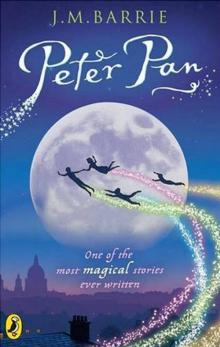 Peter Pan
Peter Pan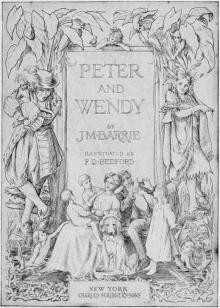 Peter and Wendy
Peter and Wendy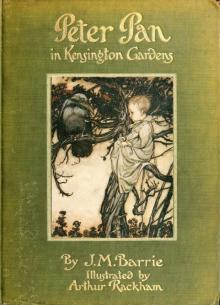 Peter Pan in Kensington Gardens
Peter Pan in Kensington Gardens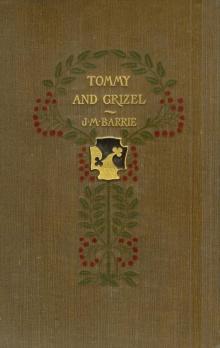 Tommy and Grizel
Tommy and Grizel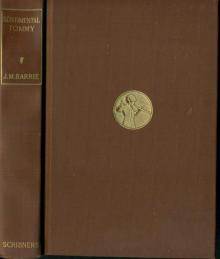 Sentimental Tommy
Sentimental Tommy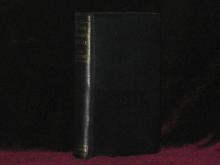 When a Man's Single: A Tale of Literary Life
When a Man's Single: A Tale of Literary Life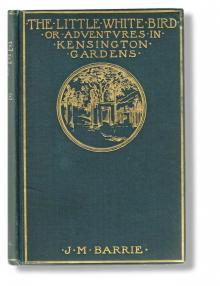 The Little White Bird; Or, Adventures in Kensington Gardens
The Little White Bird; Or, Adventures in Kensington Gardens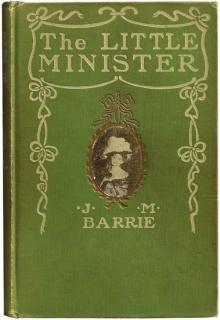 The Little Minister
The Little Minister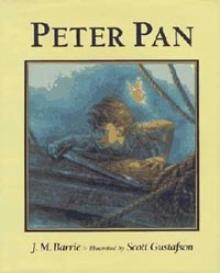 Peter Pan (peter pan)
Peter Pan (peter pan)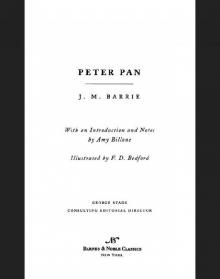 Peter Pan (Barnes & Noble Classics Series)
Peter Pan (Barnes & Noble Classics Series)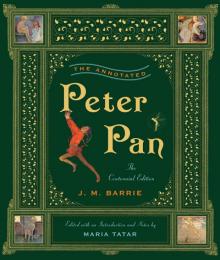 The Annotated Peter Pan (The Centennial Edition) (The Annotated Books)
The Annotated Peter Pan (The Centennial Edition) (The Annotated Books)